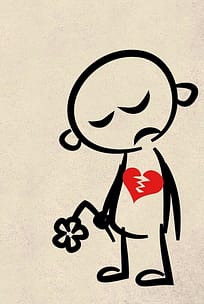When I was trying to think about how to begin my very first post on a blog about grief, the question I most wanted to address right away was: is grief forever? I guess that’s because I’m many years out from loss now and yet…I still have moments in which it feels as though it just happened.
Outwardly, I have appeared to “move on” (you know, moving, working, relationships, etc…). People who know my story usually assume I’m okay now. Those who don’t know me don’t think that anything ever happened because no one is going to ask random people, “Hey, have you had any tragic loss in your life lately?” And I certainly don’t talk about it to many people myself.
So, What Happened?
I met my late husband, Charlie, in 2005 and we got married in 2007. Before Charlie, I had been in a very unhappy relationship with someone else who was very good at treating me like an afterthought, being borderline verbally and emotionally abusive and then gaslighting me into believing otherwise. Charlie was a breath of fresh air. He was very focused on me and our relationship and our future family. All of those things were intensely important to him and this was wonderful and perfect because this is what was also most important to me.
Besides these things, what I also wanted very badly was to have children who were very close and connected with their father. I wanted to witness a great daddy/child relationship because while growing up, my brother and I did not have this closeness with our dad. Our dad was good at providing the physical things you need, like food and shelter and clothing. But when it came to mental and emotional health, he was very removed and unavailable.
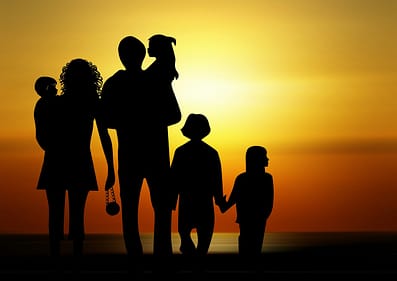 So, because of my history of being around emotionally unavailable men, I fell head over heels for Charlie, who was a teacher and loved enormously by every one of his students (Many of them even came to his memorial service and post on his Facebook page to this day about how much they miss him). This was the man who would be the husband and father that I wanted and needed. And sure enough, when our four children came along (between 2006 and 2010), Charlie was indeed the best father figure I could have hoped for. He always had their pictures with him everywhere. He talked about them constantly to me and everyone else. He planned activities with them and played games with them. He homeschooled them. He taught them how to ride bikes. He was the proudest Papa you could ever imagine and it was the absolute best gift he could have given me.
So, because of my history of being around emotionally unavailable men, I fell head over heels for Charlie, who was a teacher and loved enormously by every one of his students (Many of them even came to his memorial service and post on his Facebook page to this day about how much they miss him). This was the man who would be the husband and father that I wanted and needed. And sure enough, when our four children came along (between 2006 and 2010), Charlie was indeed the best father figure I could have hoped for. He always had their pictures with him everywhere. He talked about them constantly to me and everyone else. He planned activities with them and played games with them. He homeschooled them. He taught them how to ride bikes. He was the proudest Papa you could ever imagine and it was the absolute best gift he could have given me.
But in 2008, Charlie was diagnosed with head and neck cancer. He had a tumor on the back of his tongue that had spread to lymph nodes in his neck. He had chemo and radiation and it went away for a few months. Then it came back. More radiation. But this time, it damaged the tissue in his mouth so much that he developed radionecrosis (where the wound caused by radiation is unable to heal and there’s not much that can be done about it). Eventually his ability to eat and drink went away altogether and he was confined to a feeding tube. With a constant unhealed wound, Charlie was always in pain and getting infections.
Despite all this, we continued to try to focus on and build our family unit as much as possible. Also, doctors were always positive about a full recovery in time. Even with all the turmoil, I still had a family that belonged to me and just me and one that I felt like I belonged in. One that felt far more loving and close than anything I had had before.
But as the years went by, things slowly got worse and worse as the cancer refused to leave plus the treatments diminished his quality of life. I essentially became a single mother long before I actually lost Charlie as well as his full time caregiver. Our lives began to completely revolve around hospitals and doctors appointments.
In 2013, my mother died, abruptly. Here and fine one day, gone the next, due to complications from diabetes. This abrupt grief on top of what I now know to be anticipatory grief concerning Charlie was almost too much. She and my grandmother had been a comfort to at least speak to during this time, even though they lived far away. They always tried to help in whatever ways they could.
In 2015, his cancer had returned full force and he underwent surgery that removed his entire tongue and larynx. Now, he could no longer speak.
By the summer of 2016, the cancer had returned once again and had spread to his spine. More radiation. Horrendous pain on levels like never before. Now, he could no longer walk.
By fall of 2016, the cancer had spread to his liver, adrenal glands and pelvic region. Nothing further could be done. Hospice was put into place and on November 11, 2016, six days after our first baby girl’s birthday, eleven days before my birthday, and fourteen days before our first baby boy’s birthday, I lost Charlie forever.
I Wanted to Forget.
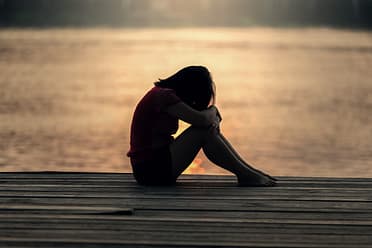
I also don’t mention how in the later years, things were so bad that I had almost no time to eat or sleep. Whenever I was able to sleep, my sleep was filled with horrible nightmares. I spent a lot of time crying. I would make dinner while crying. I would tend to the kids while crying. I went grocery shopping while crying. Once a delivery man came to drop off some medical equipment and explain how it worked. I cried through the entire thing. I remember the look of genuine sorrow in that man’s eyes. I also remember how about an hour later, he sent me a text message to my phone number, which was listed on the order, telling me how I was in his prayers and he hoped nothing but good outcomes for me and my family.
But there weren’t any. I watched my husband waste away before my eyes. My children watched it, too. I wanted his pain and suffering to end. I want to forget but I’ll never forget the day I came home and had to tell them that Daddy was sent to hospice and that he wasn’t going to come home again.
Yes, I wanted to forget. I wanted to pretend none of this had happened and that our family and our dreams weren’t just utterly destroyed by stupid, awful, horrendous cancer. I wanted to forget that a man who had wanted to be a father so badly had to leave our children behind to grow up without him. I wanted to pretend that we were one of those happy, normal families who got to go do all the fun parts of being a family.
Everyone Got Tired of Me.
I did not seek out grief help or therapy for a year. I was advised to but I refused. With the exception of my journal and reading websites, I did not really want to talk about it.
Many grievers seek out the support immediately and need to talk about what happened. I wasn’t one of those. As far as I was concerned, I had spent 8 years grieving already. I didn’t want to be near anything having to do with death or sadness or grief. I didn’t want to see hospitals ever again. And I had an almost hatred for doctors and nurses.
Grief didn’t hit me fully until I approached the one year anniversary of Charlie’s death. I had started having some warning signs before that, though. I realized I didn’t like holidays anymore. I realized I didn’t care about socializing in any way. I found it somewhat unbearable anyway being an introvert but now I had a new level of repulsion. When I was around people, I found the normal, day to day life chatter irritating and I couldn’t relate to any of it. In fact, I couldn’t relate to anyone at all. People seemed to get extremely upset over small things that I now found meaningless. I had wanted to be normal but now I realized that I hated being around “normal” people with their untouched-by-grief family lives.
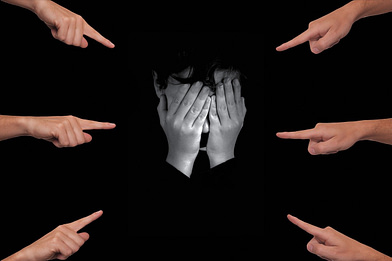
Which brings me to how scatterbrained and unfocused I had become. I was a single mom trying to raise four small children and no matter how hard I tried, I always seemed to come up short somewhere. I used to have a photographic memory but now I forgot things easily. I also became extremely clumsy. I was always dropping things and breaking things. I had no idea who I was anymore. And I didn’t care.
Between my rage, scatterbrain and inability to focus or socialize, many people were often impatient and angry with me or would ghost me. As time went on, they couldn’t understand why I wasn’t getting over the losses in my life. They didn’t understand why I couldn’t remember anything or why I was always so tired. I was also unprepared for being faced with some widow stereotypes. For example, some women treated me as if I secretly planned to steal their husbands if any of them happened to talk to me. Others viewed me as a potential golddigger and asked pointed, personal questions about my finances and living arrangements under a guise of concern for me. In general, people just wanted to go back to their regular lives and that didn’t include me. Unlike them, I had no regular life to return to.
On top of this, my grandmother had been diagnosed with dementia and was slowly forgetting everything.
I felt abandoned by almost everyone. My mom was gone, my husband was gone, and now my grandmother was leaving. The only people that I could trust completely turned out to be my own kids. They had been through the same trauma so they understood me. I stopped socializing. I didn’t want much to do with anyone else. Solitude, while lonely at times, kept me safe from mean people. But I wanted to be able to talk to someone sometimes. So, I finally turned to grief therapy and have been in it ever since.
To Hell with Grief. Forever.
I was lucky enough to eventually meet someone in one of the in person support groups. His name is Michael and he, too, had experienced the pain of losing a spouse. We were friends for a year and then we began dating and eventually got married. I never thought I’d be courageous enough to open my heart to someone again. But I felt like Michael understood me in a way that no one else had.
Once I found this relationship, I thought that this would change everything. I thought it would completely fill the emptiness. I thought I’d get my lost love and family back. Goodbye grief forever, I thought! No longer will I be tormented by nightmares and loneliness and lack of belonging and women won’t side eye me, thinking I’m going to steal their men and their money.
And many things were better. I found out I was able to love again in a different way. I had someone who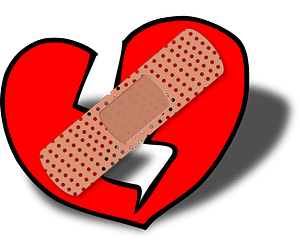
I had thought for sure I would be free and could now fully pretend that I was just like everyone else again. You know, normal.
I’m not Normal. I’ve Got Grief.
Over the years, I had often thought about starting a website centered around grief and its lasting effects on one’s life. While I was working on my art history degree, I even did a special project for one of my classes on the benefits of art and writing activities for grief. I named that project, “Grieving Arts” which is how this site got its name.
Except for my once a week individual grief therapy and my journal and art, I never talk about this stuff because people rarely give me the response I need or want. Sometimes I don’t even know what it is I need or want, which makes it even harder. But after this summer when I was once again triggered very badly over something that is too painful to mention right now, I began to reconsider creating this blog to allow for some kind of space in my new life that helps manage emotions related to grief. A space to connect with others who carry this same ache no matter how they move forward in life.
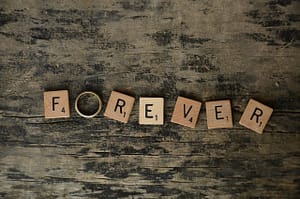
But on the flip side, one of my distant family members recently lost her spouse and I found myself able to provide her with an understanding and support that she hadn’t been getting in her immediate surroundings. And that’s when I began to think seriously about going ahead and posting online content about grief because obviously I’m not the only one who feels this way. And if it helps even one person to feel a little better, then I would like to be able to help.
So, is grief forever? Well, so far, I have found that no matter where you go, or what you move on to do, you’re always going to remember the loss. And it’s always going to hurt.
But we can try to muddle through this together. Especially in a world that keeps on going.
